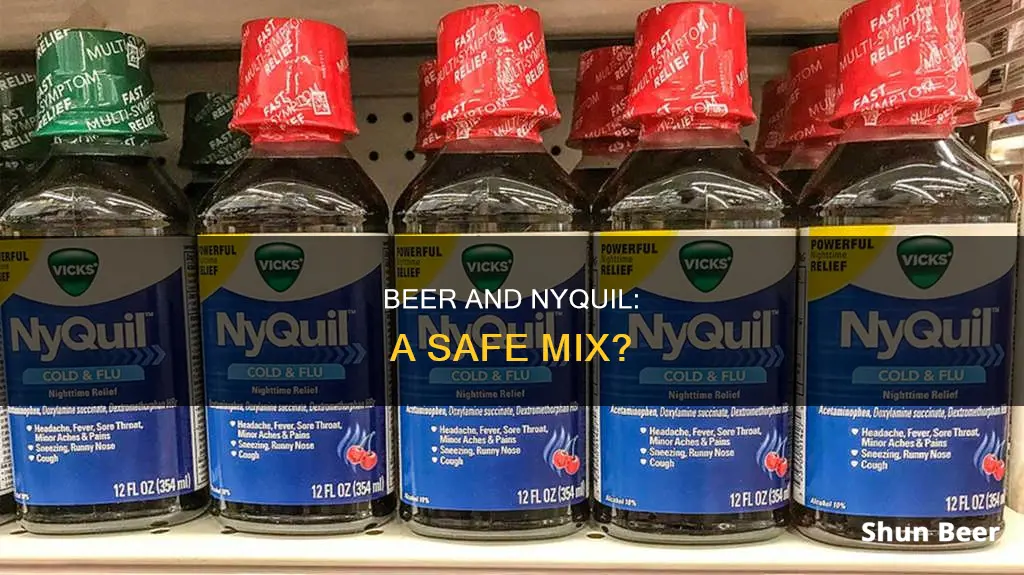
Drinking alcohol after taking Nyquil is not recommended. Nyquil is an over-the-counter medication used to treat symptoms of the common cold, flu, and allergies. It contains a combination of active ingredients, including an antihistamine, a cough suppressant, and a pain reliever/fever reducer. While Nyquil does not require a prescription, it is important to follow the recommended dosage and precautions outlined on the packaging to avoid potential health risks. One of the key risks associated with Nyquil is the potential for liver damage, especially when combined with alcohol.
Alcohol is a central nervous system depressant, which means it slows down brain activity and induces sedation. When mixed with Nyquil, the sedative effects of both substances are amplified, leading to excessive drowsiness, confusion, impaired cognitive function, and reduced alertness. This combination can increase the risk of accidents, falls, and injuries. Additionally, both alcohol and Nyquil are processed by the liver, and consuming them together can put excessive strain on this organ, potentially leading to liver damage or failure.
Other risks associated with mixing alcohol and Nyquil include impaired judgment and coordination, increased risk of overdose, and respiratory depression. It is important to note that these risks are not limited to Nyquil alone but can occur when mixing alcohol with any medication. Therefore, it is always advisable to consult a healthcare professional before consuming alcohol or combining it with any medication, including Nyquil.
What You'll Learn

Nyquil contains alcohol
Nyquil is an over-the-counter medication that helps treat symptoms associated with colds and the flu, such as cough, runny nose, and aches and pains. It is available in various forms, including liquids and capsules. Notably, many Nyquil products contain alcohol, although it is not listed as an active ingredient. Instead, alcohol is used as a solution to dissolve the active ingredients.
The liquid form of Nyquil contains approximately 10% alcohol, similar to the alcohol content in white wine. However, it is important to note that the recommended dose of Nyquil is much smaller than a typical glass of wine, so the actual amount of alcohol consumed is relatively small. Nevertheless, the presence of alcohol in Nyquil is significant when considering whether it is safe to drink alcohol after taking Nyquil.
Consuming alcohol while taking Nyquil is generally not recommended. Alcohol can enhance the effects of the active ingredients in Nyquil, leading to potentially harmful consequences. Specifically, alcohol can amplify the side effects of Nyquil, such as dizziness and drowsiness. This is because Nyquil contains several active ingredients that interact with alcohol:
- Acetaminophen, which is a drug that eases pain and reduces fever. Both acetaminophen and alcohol are metabolized by the liver, and combining large amounts of both can lead to liver damage.
- Dextromethorphan (DXM), which acts as a cough suppressant. In higher doses, DXM can cause a sensation similar to drunkenness, and these effects are amplified when combined with alcohol.
- Doxylamine succinate, which is an antihistamine that helps with a runny nose and sneezing. Doxylamine succinate is a central nervous system depressant and has sedative effects, similar to alcohol. Combining the two can lead to a dangerous level of sedation.
Mixing Nyquil and alcohol can result in several short-term side effects, including increased drowsiness, increased heart rate, loss of coordination, and increased risk of alcohol addiction. In severe cases, especially when large amounts of alcohol are consumed, the combination may lead to liver damage, impaired immune system function, overdose, or accidental death. Therefore, it is generally advised to avoid consuming alcohol while taking Nyquil to prevent these potential negative consequences.
Beer and Sore Throats: Is It Safe to Drink?
You may want to see also

Mixing Nyquil and beer can worsen side effects
It is not recommended to mix Nyquil and beer, or any other alcoholic beverage, as this can worsen side effects and lead to serious complications. Nyquil is an over-the-counter medication used to treat symptoms of the common cold, flu, and allergies, such as runny nose, sore throat, cough, aches, and fever. It contains several active ingredients, including an antihistamine, a cough suppressant, and a pain reliever/fever reducer. While Nyquil is safe to take at the recommended dosage, mixing it with alcohol can have detrimental effects on the body.
Both alcohol and Nyquil are central nervous system depressants, which means they slow down brain activity and induce sedation. When combined, their effects are amplified, resulting in excessive drowsiness, confusion, and impaired cognitive function. This increased sedation and drowsiness can affect an individual's ability to perform tasks that require focus and precision, such as driving or operating machinery, increasing the risk of accidents and injuries.
Additionally, mixing Nyquil and alcohol can lead to impaired judgment and coordination, further elevating the risk of accidents and falls. The combination may also increase the risk of overdose, as Nyquil contains acetaminophen, which can be toxic to the liver in high doses. Consuming alcohol while taking Nyquil increases the likelihood of an unintentional acetaminophen overdose, which can have severe consequences for the liver.
Another concern is the impact on the respiratory system. Both substances can depress the respiratory system, reducing the rate of breathing. When taken together, this effect can become more pronounced, leading to dangerous breathing difficulties or even respiratory failure. This is especially concerning for individuals with underlying respiratory conditions such as asthma or chronic obstructive pulmonary disease (COPD).
Furthermore, mixing Nyquil and alcohol can put excessive strain on the liver. Alcohol is known to cause liver damage, such as inflammation, fatty liver disease, and cirrhosis when consumed in excess. The active ingredients in Nyquil, particularly acetaminophen, can also harm the liver, and this effect is amplified when combined with alcohol. This combination may result in severe liver damage or even liver failure.
It is important to note that these risks are not limited to heavy alcohol consumption. Even small to moderate amounts of alcohol can interact with Nyquil and lead to unpleasant and potentially dangerous side effects. Therefore, it is generally advised to avoid consuming any amount of alcohol while taking Nyquil. If you have already mixed Nyquil and alcohol, it is recommended to stop drinking immediately to reduce the risk of undesirable side effects.
Gluten Allergy and Beer: Is It Safe to Drink?
You may want to see also

Liver damage is a possible consequence
NyQuil contains acetaminophen, which can be toxic to the liver in high doses. Alcohol consumption increases the risk of unintentional acetaminophen overdose, further elevating the chances of liver damage. The liver is responsible for breaking down both acetaminophen and alcohol. Therefore, when consumed together, they can put excessive strain on this vital organ.
Alcohol is known to cause liver damage, such as inflammation, fatty liver disease, and cirrhosis when consumed in excess. The active ingredients in NyQuil, particularly acetaminophen, can also harm the liver, especially when combined with alcohol. This combination can lead to severe liver damage or even liver failure.
The risk of liver damage is further heightened if an individual consumes large amounts of alcohol while taking NyQuil. In such cases, the potential for severe liver damage is significantly increased. Additionally, the combination of alcohol and NyQuil can lead to other adverse effects, such as impaired judgment, mental health issues, confusion, and dizziness.
It is crucial to note that the potential for liver damage is not limited to NyQuil alone. Mixing alcohol with any medication that contains acetaminophen or has similar effects on the liver can have serious consequences. Therefore, it is always advisable to consult a healthcare professional before consuming alcohol or combining it with any medication.
The Magic Behind Draft Beer: Bar System Explained
You may want to see also

Mixing the two can lead to overdose
Mixing Nyquil and alcohol can have serious health consequences. Nyquil is an over-the-counter medication used to treat symptoms of the common cold, flu, and allergies. It contains a combination of active ingredients, including an antihistamine, a cough suppressant, and a pain reliever/fever reducer. While Nyquil can be effective in providing relief, it is important to follow the recommended dosage and precautions on the packaging.
One of the primary risks of mixing Nyquil and alcohol is the potential for liver damage or failure. Both substances are metabolized by the liver, and consuming them together can place additional stress on this organ. Acetaminophen, an active ingredient in Nyquil, can be toxic to the liver in high doses, and alcohol consumption further increases the risk of unintentional acetaminophen overdose. This combination can have severe and detrimental effects on the liver, including inflammation, fatty liver disease, and cirrhosis.
In addition to liver-related issues, mixing Nyquil and alcohol can lead to an increased risk of overdose by depressing the respiratory system. Both substances can reduce the rate of breathing, and when taken together, this effect is amplified, leading to dangerous breathing difficulties or even respiratory failure. The sedative effects of alcohol and Nyquil can also result in excessive drowsiness, confusion, and impaired cognitive function, which can be life-threatening in certain situations such as driving or operating machinery.
The combination of Nyquil and alcohol can also cause impaired judgment and coordination, increasing the likelihood of accidents and injuries. Additionally, alcohol can intensify the side effects of Nyquil, such as dizziness and drowsiness, particularly for products containing dextromethorphan and doxylamine. Furthermore, alcohol can exacerbate the symptoms of a cold or flu, such as headaches, fatigue, and dry mouth, prolonging the illness as it impairs the immune system.
It is crucial to avoid mixing Nyquil and alcohol to prevent these harmful consequences. If you or someone you know is struggling with alcohol dependency or has combined these substances, seek professional medical help immediately.
Beer and Diabetes: What Type 2 Patients Need to Know
You may want to see also

It's not safe to drive after consuming both
It is not safe to drive after consuming both Nyquil and alcohol. The combination of these substances can impair your judgment, coordination, and reaction time, making it unsafe to perform tasks that require alertness and precision, such as driving or operating machinery.
Nyquil is an over-the-counter medication commonly used to treat symptoms of the common cold, flu, and allergies. It contains a combination of active ingredients, including an antihistamine, a cough suppressant, and a pain reliever/fever reducer. One of the active ingredients in Nyquil, doxylamine, is a central nervous system depressant that interacts with alcohol. This means that consuming Nyquil and alcohol together can lead to increased sedation and drowsiness, reduced alertness, impaired cognitive function, and slowed breathing. These effects can be amplified if Nyquil products containing dextromethorphan and doxylamine are consumed with alcohol.
Alcohol is also a central nervous system depressant and acts as a stimulant and a sedative. At higher doses, alcohol depresses the central nervous system, causing slowed breathing and increased response time. When combined with Nyquil, these effects are amplified, leading to excessive drowsiness, confusion, impaired cognitive function, and even respiratory failure in severe cases.
The combination of Nyquil and alcohol can also increase the risk of liver damage or failure. Both substances are processed by the liver, and consuming them together can put excessive strain on this vital organ. Acetaminophen, an active ingredient in Nyquil, can be toxic to the liver in high doses. Consuming alcohol while taking Nyquil increases the risk of unintentional acetaminophen overdose, which can lead to severe liver damage.
In addition to the increased risk of liver damage and impaired coordination, judgment, and breathing, mixing Nyquil and alcohol can also increase the risk of overdose and accidental death. Therefore, it is strongly advised to avoid consuming both substances together and to wait until the effects of one substance have worn off before consuming the other. It is especially important to refrain from driving or operating heavy machinery until the effects of both substances have completely worn off.
Understanding the Working of a Cup Beer Dispenser
You may want to see also
Frequently asked questions
No, you should not drink Nyquil after drinking beer. Mixing alcohol and Nyquil can amplify the sedative effects of both substances, causing excessive drowsiness, reduced alertness, impaired cognitive function, and impaired coordination. This increases the risk of accidents, falls, and injuries.
Mixing Nyquil and beer can lead to several health risks, including liver damage, impaired immune system, and increased risk of overdose and accidental death. Both substances are hard on the liver, and consuming them together can cause severe liver damage or failure.
If you've already mixed Nyquil and beer, it is recommended to stop consuming alcohol immediately. If you've only had one or two beers, there is likely no cause for concern. However, if you've consumed more than that, it is best to seek medical attention as a precaution.
The side effects of mixing Nyquil and beer include increased drowsiness, increased heart rate, loss of coordination, and an increased risk of alcohol addiction. In severe cases, mixing these substances can lead to liver damage, respiratory depression, coma, sleepiness, and even death.







